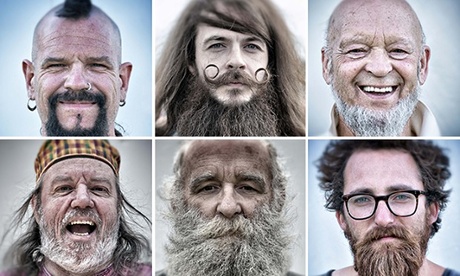Peak Peak ?
Posted by Big Gav
I thought declaring Peak Everything peaked a few years ago, but according to The Guardian peak peakism only recently passed by - Have we reached peak peak? The rise (and rise) of a ubiquitous phrase. Can't say I'm going to miss beards...
Rob Brooks is the Australian researcher who used the term "peak beard" back in April, triggering write-ups on news portals around the world and, eventually, when coverage had crested, the phrase "peak peak beard". The Guardian's report alone was shared 28,601 times on Facebook. But Brooks was not first to use the term peak beard. In 2013, the Guardian used the phrase in a story that was shared a humbler 926 times, which goes to show: you can peak too soon. In the late 16th century, peak beards – beards shaped like an isosceles triangle – had a moment. But nobody recalls those now. If they did, someone would have called peak peak peak beard: too many stories about the popularity of peak beards.Not all peaks are bristle-related. Before beards there was "peak stuff", the title of a 2011 research paper by the environmental writer Chris Goodall. He says he came up with the phrase because "the characteristic meme among environmentalists is that everything is getting worse all the time. I started to notice that this wasn't the case. In fact, there's a lot of evidence that humankind's impact on the environment in mature economies has peaked." He cites "things such as the amount of waste we produce, the amount of fertiliser we throw on food, the weight of clothing we buy".
Where else had he seen or heard the phrase "have we reached peak ..."?
"I was hoping you were going to say that I was the first person to do this," he says. But by 2011, other peaks had already cut through: "peak times" (Urban Dictionary, 2010), for instance, or plain "peak" (2009), meaning very good or very bad. Further back in time, the references fall away. Before 2009, the only peaks in Urban Dictionary were "very erect nipples".
"Have we reached peak X?" belongs to a family of tropes known as snowclones – a templated phrase whose components offer tireless possibilities for adaptation and regeneration. Other examples are "X is the new Y", "We are all X now" and "How I learned to stop X and love Y".
The authority on Snowclones is the Language Log blog run by celebrated linguists Geoffrey Pullum and Mark Liberman. "This particular idiom is hard to track," emails Liberman, "because 'peak NOUN' is a commonplace expression, with head nouns denoting things that are (or can be) measured, eg 'peak performance', 'peak demand', 'peak power'." In other words, the usage is too broad, and the adjective too common to be traced on databases. It would be impossible to separate comic formulations from more serious peaks.
There is some good news, though. Liberman remembers the first time he noticed the phrase. It was in 2008, when the US writer John Cole blogged that "we may have hit and passed Peak Wingnut", a derogatory term for rightwingers.
Cole's post is nearly six years old, but can he recall what inspired the phrase? "I came up with 'peak wingnut' because I was shocked," Cole says. "The Republicans seemed to get crazier and crazier. The source of it is [US blogger] Kevin Drum. At the Washington Monthly, one of the things he was always talking about was peak oil."






